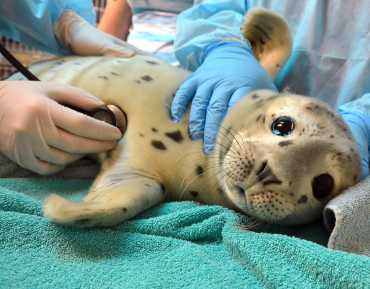
Pupping Season Is Underway as Young Elephant Seals Like Cone Rehabilitate at Our Hospital
- Malnutrition
During pupping season up and down the California coast, seal pups are sometimes found stranded and in need of critical care. If you see a marine mammal in distress, call our rescue hotline: 415-289-SEAL (7325).
Each winter along the California coast, northern elephant seals gather on their breeding beaches, called rookeries, to give birth and mate. During the first few months of the year, the rookeries are full of 75-pound newborn pups galumphing after their mothers.
In mid-February, our rescue hotline received a call from a concerned beachgoer at Año Nuevo State Park, a popular elephant seal rookery, reporting that a young pup was stranded and appeared to be in desperate need of help.
Our trained response volunteers were dispatched, and after carefully evaluating the scene, determined that this pup’s life was in danger. Named Cone, he was rescued and admitted to our hospital as our first northern elephant seal patient of this year.
When Cone arrived at our hospital, he was still molting some of his blackcoat, or baby fur, which elephant seals shed for a smooth, silvery coat once they’ve weaned from their mother at about 1 month old. This was a sign to our animal care experts that Cone was old enough to be on his own, but what concerned them was how skinny and malnourished this pup was.
You see, elephant seal pups nurse from their mother and gain about 10 pounds a day during their first month of life, which means a pup like Cone should have been nearly 300 pounds—alarmingly, he weighed just 61 pounds upon admit.
Weighing even less than what he would have at birth, Cone clearly wasn’t getting the nutrition he needed out in the wild. But luckily for this starving pup, kind people like you made sure our animal care staff and volunteers were prepared to give him expert medical treatment.
For now, Cone is being tube-fed nutritious “fish smoothies” to help him put on a healthy amount of weight. He’s also begun lessons in “fish school,” where our specially trained volunteers use tactics like dragging herring on a string through the water to engage a pup’s natural instinct to catch fish.
Once Cone recognizes that there is a link between swallowing fish and a full belly, he will practice catching whole fish on his own and competing for food with our other patients. Learning these crucial skills gives young seals their best chance of thriving after being released into the wild—and it’s thanks to support from caring people like you that these life-saving efforts are possible.
Today, the sound of hungry elephant seal cackles fills the air at our hospital—a telling sign that pupping season is well underway. Since Cone’s arrival, we’ve admitted dozens more pups to our hospital and we’re likely to see many more rescued through late June.
Unfortunately, strong storms, which are linked to climate change, often sweep young pups away before they have weaned from their mothers or learned how to survive on their own. Seal pups can also be separated from their mother much too early due to people and dogs getting too close, which can scare the mother away. This results in many young, malnourished pups in need of rehabilitation.
Did you know you can help save a life by giving animals space? If you see an elephant seal mother and pup, or any marine mammal, it’s important to remember that the best thing you can do for these animals is to keep a safe distance. Alert the experts and call our hotline at 415-289-SEAL (7325) if you see a marine mammal in distress.
Yes, I want to save a life!

Yes, I want to save a life!
You’ll be giving sick and injured animals the best possible care at the Center’s state-of-the-art hospital. With your gift today, you are giving a patient a second chance at life in the wild.
See Our Latest News
{"image":"\/Animals\/Wild\/Gray whale\/cropped-images\/two-gray-whales-golden-gate-bridge-shutterstock-0-0-1270-992-1770234810.jpg","alt":"two gray whales under the Golden Gate Bridge","title":"The Marine Mammal Center and San Francisco Harbor Safety Committee Pilot New Vessel Operator Training Program","link_url":"https:\/\/www.marinemammalcenter.org\/news\/the-marine-mammal-center-and-san-francisco-harbor-safety-committee-pilot-new-vessel-operator-training-program","label":"Press Release","date":"2026-02-06 01:00:00"}

The Marine Mammal Center and San Francisco Harbor Safety Committee Pilot New Vessel Operator Training Program
February 6, 2026
Read More{"image":"\/Animals\/Wild\/Bottlenose dolphin\/cropped-images\/dolphinphoto-by-adam-li-c-noaa-0-0-1270-992-1769539954.jpg","alt":"A bottlenose dolphin jumps out of the water.","title":"What\u2019s the Difference Between Dolphins and Porpoises? And Other Animal Trivia","link_url":"https:\/\/www.marinemammalcenter.org\/news\/whats-the-difference-between-dolphins-and-porpoises-and-other-animal-trivia","label":"News Update","date":"2026-01-26 23:00:00"}

What’s the Difference Between Dolphins and Porpoises? And Other Animal Trivia
January 26, 2026
Read More{"image":"\/Animals\/Patients\/Sea otters\/2025\/cropped-images\/so-mooring-release-2-laurie-miller-c-the-marine-mammal-center-USFWS-permit-MA101713-1-147-8-1270-992-1770307740.jpg","alt":"Sea otter - Mooring","title":"Rescue Stories: Southern Sea Otter Mooring Named the 2025 Patient of the Year","link_url":"https:\/\/www.marinemammalcenter.org\/news\/rescue-stories-vote-for-your-favorite-marine-mammal-patient-of-2025","label":"News Update","date":"2026-01-16 10:05:08"}

Rescue Stories: Southern Sea Otter Mooring Named the 2025 Patient of the Year
January 16, 2026
Read More{"image":"\/People\/Action\/Veterinary care\/cropped-images\/Harris_Green turtle_TMMC-0-0-1270-992-1767649941.jpg","alt":"Heather Harris","title":"Seattle Aquarium Awards Dr. Heather Harris With Prestigious Conservation Research Award","link_url":"https:\/\/www.marinemammalcenter.org\/news\/seattle-aquarium-awards-dr-heather-harris-with-prestigious-conservation-research-award","label":"In the News","date":"2026-01-05 04:48:00"}

Seattle Aquarium Awards Dr. Heather Harris With Prestigious Conservation Research Award
January 5, 2026
Read More


